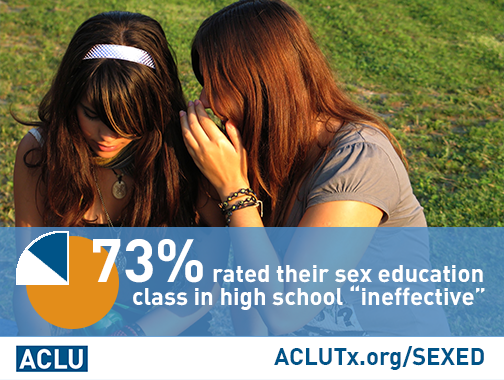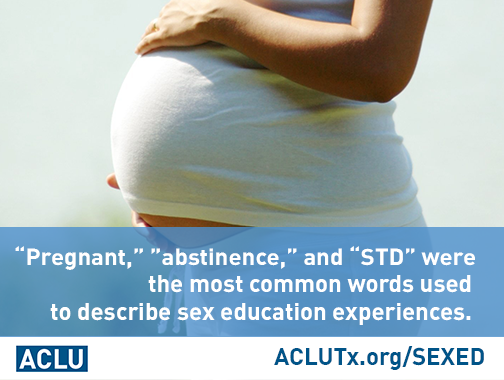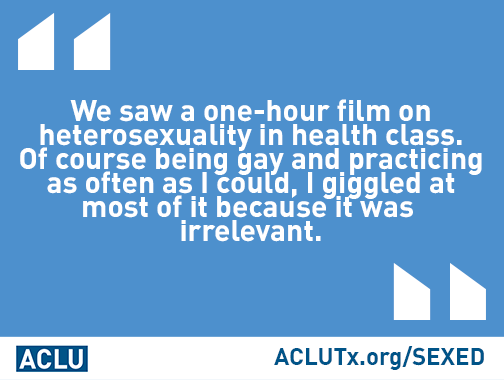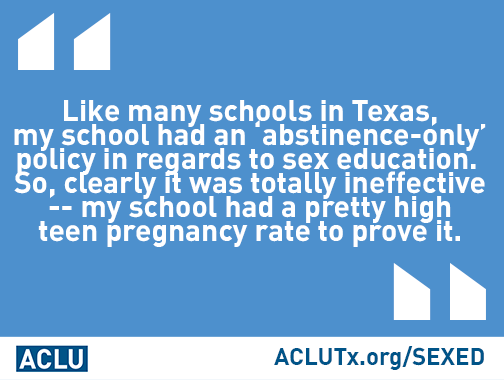
Outdated textbooks, lack of training, and gender-bias are just a few of the reasons student rated their Texas public school sex education classes “ineffective.” The unscientific survey was conducted by volunteer researcher Julia Barrow for her capstone course at Rice University. Julia was kind enough to do a short Q&A with us about the survey results and her motivation behind studying this important issue.
- Q: How did this project get started?
A: I was enrolled in the Center for Women, Gender, and Sexuality capstone course, Seminar and Practicum, where each student works on an engaged research project with a community organization while learning about Feminist methodology and research. I have always been extremely interested in education. I first wanted to focus on the Houston area and my initial question was whether or not inadequate sex education can lead to feelings of shame and an inability to speak out when an individual has been assaulted. I definitely touched on that theme in my final project, but the themes became bigger as did the geographic region I was surveying.
Q: How much time did you spend on the project?
A: I spent each Friday at the ACLU offices, attended a 3-hour seminar once a week, and spent 3 to 15 hours a week working on the project outside of the office or class.
Q: How did you collect the responses?

- A: I had a three-pronged approach to collecting responses. Pursuant to Texas Public Information Act, Texas Government Code Ch. 552, I was able to order Open Records Requests to receive curricula from high schools with varying degrees of graduate rates, pregnancy rates, demographics, and socioeconomic status. I conducted interviews with health education teachers and other education professionals. The biggest pool of responses I analyzed was from an online survey asking Texans of all ages to describe their sex education experiences. With all of these, I conducted a linguistic analysis to pick out common themes to direct my thoughts and outside research.
Q: What were your main findings?

- A: 73.3% of individuals reported their sex education to be ineffective. This rate did not change according to the age of the individual (which ranged from 18 to 80), begging the question of why sex ed has not improved in Texas for so long. Schools often use outdated Health textbooks that have old-fashioned, heteronormative language and ideas. Contraception, abortion, and how to receive services were not often reported to be discussed. Any topic related to relationships, intimacy, and love were never mentioned and male forms of contraception (i.e. condoms) were discussed more often than female forms of birth control.
Q: Did you expect these findings? What surprised you most?
A: One of the findings that surprised me the most was that there was no change in people's perceptions about their sex ed experience due to age. I was surprised and saddened by how many of my findings mirrored the stereotype I had heard about Texas and sex education and reflected the statistics that the state has among the highest rates of teenage pregnancy and sexually active teens.
Q: What should Texas do to change?

- A: On a high level, the TEKS do not presently mandate sex ed to be taught and do mandate that if is discussed, abstinence be the central topic. As I just said, more teens in Texas are having sex than the national average. And, my findings, as well as larger studies that show high rates in teen pregnancy and STDs, prove that the system in place now is not effective. It's ludicrous to me that abstinence could even be the "central topic" - what more can you say after, "The best way to not get pregnant or sexually transmitted diseases is by staying abstinent"? It's true, but teens are not listening to it. In addition, schools that do have sex ed or health ed that discuss sexuality should not use outdated textbooks that present sexuality in a heterosexual, heteronormative way (effectively marginalizing their homosexual or queer students). Moreover, they need to talk about contraception, how to use it, and where to get it.
Q: Tell us about the The Women's studies program at Rice?

- A: I had the privilege of minoring in Poverty, Justice, and Human Capabilities, which is housed under the Center for the Study of Women, Gender and Sexuality at Rice. My PJHC and many of my English classes were crosslisted with SWGS classes, which meant that I was often looking at other subjects through a gendered lens. The Women's studies program at Rice is simply amazing. The Center's staff, such as Dr. Rosemary Hennessy and Brian Riedel, and the PJHC staff, including Dr. Kimberly Hoang and Dr. Diana Strassman, changed my life with their ability to instruct and inspire.
Q: What have you been doing since you finished the survey?

- A: I graduated magna cum laude with a degree in English and a minor in Poverty, Justice, and Human Capabilities from Rice University in May 2013. I am currently working in Los Angeles, CA.
Q: What are your next steps?
A: I am loving my job at Amazon Studios in Los Angeles, CA, and have long term plans to attend law school. I would love to work for the ACLU again one day 🙂
Download a copy of Julia's final presentation (PDF): An Exploration of Sex Education Policies in Texas Public High Schools


